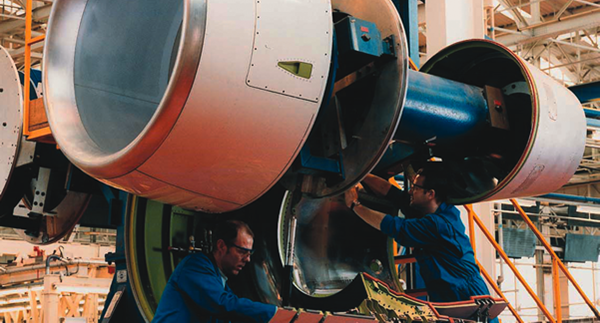Manufacturing seeks help
With the manufacturing sector experiencing a further decline in output and continual job losses, it is calling for the Executive to intervene. Meadhbh Monahan reports.
Northern Ireland needs a low carbon economic zone along the lines of the One North East regional development agency’s plan to transform the industrialised north east of England through sustainable economic development.
According to Bryan Gray, Chief Executive of Northern Ireland Manufacturing, a similar venture here would “encourage companies to get into the green market.”
Since the recession hit the UK, One North East has acquired £10 million in transition loan funds for 4,000 firms, developed key industries such as low carbon vehicles and offshore wind, and attracted 53 inward investment projects to the region.
The manufacturing sector is “continuing to suffer and they can’t see a light at the end of the tunnel”, Gray states.
The latest Northern Ireland Index of Production – a survey of 600 companies that is designed to measure change in manufacturing, electricity and gas – shows that the province recorded a 2.8 per cent decrease in manufacturing output during the first quarter of this year compared to the same period last year. On the other hand, UK output increased by 1.8 per cent. Over the last four quarters, our manufacturing output has decreased by 10.2 per cent. A total of 350 jobs went when two US companies left the province this year and 115 jobs were lost in Derry after the Arntz Belting company closed in January.
The Department of Enterprise, Trade and Investment’s July quarterly employment survey illustrates that the manufacturing categories of chemicals, food, drink and tobacco and metal all decreased in the last quarter, but wood, paper and refined petroleum increased slightly.
“The recession continues,” Gray states. “But it seems to be easing elsewhere in Britain.”
He adds: “Companies are particularly coming under pressure from their banks and it is difficult to see when the recession will end. The figures seem to show that things are getting worse.”
Gray’s observations are backed up by a PricewaterhouseCoopers (PwC) report from April this year which estimates that 9,000 jobs have been lost in local manufacturing since the recession hit. It claims that recovery in the province will be “lacklustre” with a 0.8 per cent GDP growth this year and a 1.8 per cent growth next year. This compares to an expected growth of 2.2 per cent in the UK and 2.75 per cent in the Republic this year.
Overall business confidence in the region is “worryingly low”, according to the report. The Ulster Bank’s Purchasing Managers Index – where a score of less than 50 reflects a decline in activity – shows that Northern Ireland’s private sector business activity in June was at 46, therefore it has been in decline for 31 consecutive months.
The report states: “Perhaps more worrying is that Northern Ireland was the only region in the UK with a negative 12-month average.”
PwC’s chief economist, Esmond Birnie, explained that “the steady rise in unemployment in services and manufacturing, combined with a credit shortage and falling public expenditure, has hit both investment intentions and business confidence.”
According to Gray, the Executive is not doing enough to help the struggling manufacturing sector.
“It is up to the Government to prove at this time that it can be light on its feet and take decisive action to support and stimulate the sector.”
He called for an “active partnership” with others, including government. An agency similar to the One North East would “encourage innovation, support enterprise and facilitate growth” and it should not be hampered by “bureaucratic barriers,” Gray contends.
The decision by the UK Government to reduce corporation tax from 28 per cent to 24 per cent over the next three years is welcomed by Gray.
With companies doing business in the Republic in order to avail of the 12.5 per cent corporation tax rate, Gray believes a reduction would “offset the cost of doing business in Northern Ireland.”
Capping industrial rates at 30 per cent was probably a saving grace for some companies and Gray believes it must be retained after 2011.
“We hope that the Assembly will realise that manufacturing in Northern Ireland continues to be costly, particularly in terms of transport and energy costs and that they will support manufacturing by realising that the continuation of the industrial rate cap is invaluable for local businesses,” he states.
The Treasury’s pledge to investigate the local reduction of corporation tax and the establishment of an enterprise zone would, in his view rebalance the economy and boost the private sector. However, Gray wonders why DETI has not reintroduced these zones already considering that the legislation is in place and there were enterprise zones in Belfast and Derry in the 1980s.
A DETI spokeswoman told agendaNi that the Enterprise Zones (Northern Ireland) Order gave the former Department of the Environment (which had a wider range of responsibilities than its current successor) the power to designate enterprise zones in Belfast in 1981 and in Derry in 1983.
She said: “These were intended as an experiment to tackle localised problems of economic decline, urban decay and physical dereliction.”
Businesses located within enterprise zones enjoyed rate relief and the relaxation of some statutory or administrative controls, such as planning restrictions. Each zone was normally designated for a fixed life of 10 years and the last designations expired in 2006.
The spokeswoman concluded: “A review later in the 1980s found that the Northern Ireland enterprise zones produced poor value for money because companies operating out of them were taking business away from other existing companies located elsewhere, with no additional benefit to the economy.”
Consequently, no new enterprise zones have been created anywhere in the UK since the 1990s.






